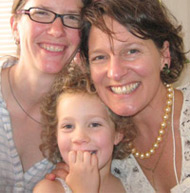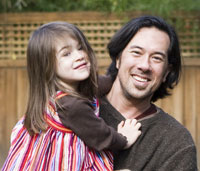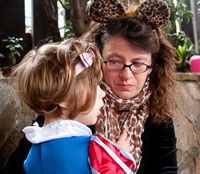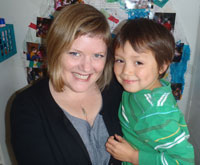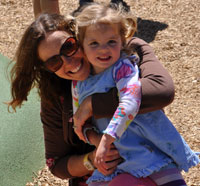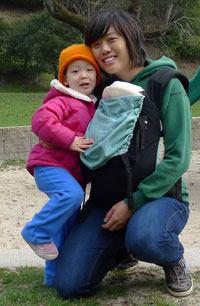Curriculum: We base our work with children in the firm belief that children are competent and capable, constantly seeking opportunities to manifest their competence. We see children and teachers as co-learners, partnering to enhance the learning process through reciprocal interactions and exploration.
It is our belief that well-balanced curriculum is child-centric and play based. It engages children in short and long-term projects where real investigations are pursued. Short and long-term projects are in-depth studies of concepts, ideas, and interests, which arise within the group. Project ideas originate as the children and teachers construct knowledge together. Children’s interests often lead to in-depth explorations that can last a few days or many weeks. Curriculum grows out of our understanding that young children learn best and thrive when their natural disposition toward curiosity is engaged and their investigations are hands-on. Children are most curious about the real world around them. They are natural researchers. As such, they respond to curriculum that emerges out of their own experiences and is enhanced by provocations and resources provided by the teachers, families, and the children themselves. Teachers become ardent researchers in partnership with the children. The role of the teacher as facilitator, listener, partner, advocate, historian, challenger and risk-taker is vital to the learning outcomes of the children. Perceptive teachers pick up on these interests and through keen observation, find ways to enhance and deepen the explorations that engage the children. Perceptive teachers also know the value of a rich environment where words, books, science, music, art, and interactions abound, all resources at a child’s fingertips. This is implemented by a variety of instructional models: project-based learning, hands-on learning centers (example: writer’s workshop), inquiry based hands- on science, along with direct instruction.
The Language Arts Program provides a strong foundation of concepts and skills to promote reading and writing. This is fostered within Writer’s Workshop: learning upper and lower case letters, individual “key” words, high frequency words and engaging in group reading activities with purpose and understanding. Accessing prior knowledge and imagination to create stories: using a combination of drawing, constructing visual displays to provide additional detail, dictating, inventive spelling and writing. Students will participate in shared research, collaborative conversations and writing projects. Students are encouraged to express their thoughts, feelings and ideas.
The Math Program develops mathematical thinkers who can compute, problem solve and think flexibly. Skills are fostered using number sense, measurement, classifying and describing, analyzing and comparing, patterns and relationships, spatial reasoning, algebraic thinking, creating shapes, identifying and describing shapes.
The Science Program: Young children are natural scientists and we will explore science by engaging in scientific inquiry based projects. We encourage children to develop an attitude of curiosity, inquiry and respect for their natural and physical environment. Science is integrated into the daily classroom life. The children will investigate, problem solve, use their senses, manipulate, discuss, sort, measure, count, hypothesize and experiment, record and test predictions based on their observations and explorations. We will be doing lots of hands-on science investigations to support our growing curiosity and wonder of the world.
Homework: I have seen both films “Race to Nowhere” and “Teach” (which I recommend parent viewing). Quality family time is very meaningful, and I will not inundate you with “busy work”. I do feel a home-to-school connection is valuable and enables parents to know what their children are learning and extends learning opportunities. These home- to-school connections will be meaningful and relevant to what we are directly learning in the classroom.
Curriculum Mapping: We offer a rich, meaningful curriculum that challenges, encourages, and support children in their quest for knowledge, recognizing the developmental stages of childhood and the unique gifts, talents, and abilities of each child. The pace of the child is reflected and honored. Student interests, teacher passion, the State Of California Common Core Standards, and the Next Generation Science Standards form the basis of our curriculum mapping.
Parent Involvement: Parents are considered an essential component of our Kindergarten program. They provide support with classroom activities, field trips, celebrations, and school events. They are a competent and active part of the community of learners that includes children, teachers and other adults.


